The 7th Annual Palm Beach Poetry Festival took place January 17-22, 2011 at Old School Square in Delray Beach. 2011 Faculty included Stuart Dischell, Jane Hirsfield, Thomas Lux, Heather McHugh, Vijay Seshadri, Alan Shapiro, Ellen Bryant Voigt, and C.D. Wright. Special Guest Reader was former US Poet Laureate, Robert Pinsky. The Performance Poets were David Blair and Taylor Mali. Participants from over 30 states, U.K., British Columbia and the Bahamas attended the festival. Two public events sold out, including Robert Pinsky’s reading where he mesmerized the audience as he performed his poems with the Paul Tardiff Jazz Trio. The Festival also sponsored, The Image, Poetry and Photography, an exhibition of photographs inspired by lines from the poems of the featured festival poets.
2011 Workshops
NOW LOOK WHAT YOU HAVE DONE with STUART DISCHELL
ENLARGING POEMS with JANE HIRSHFIELD
WORD BY WORD, LINE BY LINE with THOMAS LUX
AN ARCHITECTURE OF SENSES with HEATHER MCHUGH
THE PLOT OF THE POEM with VIJAY SESHADRI
THE CRAFT OF POETRY with ELLEN BRYANT VOIGT
WRITING AT THE EDGE OF THINGS with CD WRIGHT
STUART DISCHELL is the author of Good Hope Road, a National Poetry Series Selection (Viking 1993), Evenings & Avenues (Penguin 1996) Dig Safe (Penguin 2003) Backwards Days (Penguin 2007) and most recently, Children With Enemies (University of Chicago Press), the pamphlets Animate Earth and Touch Monkey, and the chapbook Standing on Z. His poems have appeared in The Atlantic, Agni, The New Republic, Slate, Kenyon Review, Ploughshares, and anthologies including Essential Poems, Hammer and Blaze, Pushcart Prize, and Good Poems. A recipient of awards from the NEA, the North Carolina Arts Council, and the John Simon Guggenheim Foundation, he teaches in the MFA Program in Creative Writing at the University of North Carolina Greensboro.
View poet's pageJANE HIRSHFIELD is an award-winning poet, essayist, and translator. She is the author of several collections of verse, including The Beauty (2015), a finalist for the National Book Award, and Come, Thief (Knopf, 2011), as well as a now-classic collection of essays, Nine Gates: Entering The Mind of Poetry (Harper Collins, 1997). She has also edited and co-translated four books collecting the work of world poets of the past. Hirshfield’s poems have appeared in The New Yorker, The Atlantic, the Times Literary Supplement, The Washington Post, Poetry, The American Poetry Review, and seven editions of The Best American Poetry. Honors include The California Book Award, The Poetry Center Book Award, the Northern California Book Award, three Pushcart Prizes, finalist selection for the National Book Critics Circle Award, and fellowships from the Guggenheim and Rockefeller foundations, and the National Endowment for the Arts. A frequent presenter at universities and literary festival both in the US and abroad, in 2012, she was elected a Chancellor of the Academy of American Poets.
View poet's pageTHOMAS LUX 1946-2017
Acclaimed poet and teacher, born in Northampton, Massachusetts, in 1946 to working class parents, Thomas Lux attended Emerson College and the University of Iowa. He began publishing haunted, ironic poems that owed much to the Neo-surrealist movement in the 1970s. From his first book Memory’s Handgrenade (1972), Lux’s poetry gradually evolved toward a more direct treatment of immediately available, though no less strange, human experience. Using ironic or sardonic speakers, startlingly apt imagery, careful rhythms, and reaching into history for subject matter, Lux created a body of work that is at once accessible and complex, wildly imaginative and totally relevant. Known for pairing humor with sharp existentialism, Lux commented in the Los Angeles Times, “I like to make the reader laugh—and then steal that laugh, right out of the throat. Because I think life is like that, tragedy right alongside humor.”
Lux’s first collections, including Memory’s Handgrenade and Sunday: Poems (1979), were grounded in the neo-surrealist techniques of contemporaries like James Tate and Bill Knott. Describing his own progress in an interview with the Cortland Review, he said: “I kind of drifted away from Surrealism and the arbitrariness of that. I got more interested in subjects, identifiable subjects other than my own angst or ennui or things like that. I got better and better, I believe, at the craft. I paid more and more attention to the craft. Making poems rhythmical and musical and believable as human speech and as distilled and tight as possible is very important to me. I started looking outside of myself a lot more for subjects. I read a great deal of history, turned more outward as opposed to inward.”
Lux’s other collections include New and Selected Poems: 1975-1995 (1997), The Street of Clocks (2001), The Cradle Place (2004), God Particles (2008), and To the Left of Time (2016). He was also the editor of I Am Flying Into Myself: Selected Poems of Bill Knott (2017). Thomas Lux taught at Sarah Lawrence for over 20 years, as well as at the Warren Wilson MFA program, and the Georgia Institute of Technology. In the Cortland Review interview, he described teaching’s greatest rewards: “you see people get excited by poetry. You see their lives changed by poetry. You see someone beginning to learn how to articulate and express themselves in this very tight art form, in this very distilled manner. You see all sorts and hear all sorts of really human stuff, really human business.” His many awards and honors include the Kingsley Tufts Poetry Award, a Guggenheim fellowship, a Mellon fellowship, an honorary degree from Emerson College, and three grants from the National Endowment for the Arts.
He was Bourne Professor of Poetry at The Georgia Institute of Technology in Atlanta and directed the McEver Visiting Writers Program and Poetry@Tech. Lux published over a dozen books of poetry; including Memory’s Handgrenade (1972), The Blind Swimmer: Selected Early Poems 1970–1975 (1996), God Particles (2008), Child Made of Sand (2012), and most recently, To the Left of Time (2016). See the full bibliography.
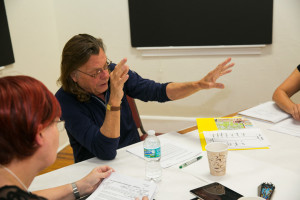 Thomas Lux chaired the Advisory Board of the Palm Beach Poetry Festival and participated as teaching faculty in every festival until his death in February 2017. His signature workshop, Word by Word, Line by Line, was always among the first choices of applicants through these years. He lent unfailing and generous support to the festival’s founder, board, to all of our staff, and to all of the festival faculty. We miss him, and we will continue to read his work and hear his voice always.
Thomas Lux chaired the Advisory Board of the Palm Beach Poetry Festival and participated as teaching faculty in every festival until his death in February 2017. His signature workshop, Word by Word, Line by Line, was always among the first choices of applicants through these years. He lent unfailing and generous support to the festival’s founder, board, to all of our staff, and to all of the festival faculty. We miss him, and we will continue to read his work and hear his voice always.
View poet's page
We were pleased to host Heather McHugh at the 3rd and 7th Annual Palm Beach Poetry Festival.
More biographical and publication information is available at https://poets.org/poet/heather-mchugh
View poet's pageVIJAY SESHADRI‘s collections of poems include James Laughlin Award winner The Long Meadow (Graywolf Press, 2005) and Wild Kingdom (1996). His poems, essays, and reviews have appeared in AGNI, The American Scholar, Antaeus, Bomb, Boulevard, Lumina, The Nation, The New Yorker, The Paris Review, Shenandoah, The Threepenny Review, Verse, The Yale Review, the Times Book Review, the Philadelphia Enquirer, Bomb, The San Diego Reader, and TriQuarterly, and in many anthologies, including Under 35: The New Generation of American Poets, Staying Alive: Real Poems for Unreal Times, and three issues of The Best American Poetry. Seshadri’s honors include grants from the New York Foundation for the Arts, the National Endowment for the Arts, and the John Simon Guggenheim Foundation; The Paris Review‘s Bernard F. Conners Long Poem Prize; and the MacDowell Colony’s Fellowship for Distinguished Poetic Achievement. He was educated at Oberlin College and Columbia University, and teaches at Sarah Lawrence College.
Learn more about Vijay in this interview from Poets & Writers: http://www.pw.org/content/interview_poet_vijay_seshadri
He was a member of the 2011 festival faculty and his workshop was titled: THE PLOT OF THE POEM.
He also serves on the festival’s Advisory Board.
View poet's page
ELLEN BRYANT VOIGT has published seven volumes of poetry—Claiming Kin (1976), The Forces of Plenty (1983), The Lotus Flowers (1987), Two Trees (1992), Kyrie (1995), a finalist for the National Book Critics Circle Award, Shadow of Heaven (2002), a finalist for the National Book Award, and Messenger: New and Selected Poems (2007), a finalist for both the NBA and the Pulitzer. She co-edited an anthology of essays, Poets Teaching Poets, and collected her own essays on craft in The Flexible Lyric. Most recently, The Art of Syntax: Rhythm of Thought, Rhythm of Song, was published in the Graywolf Press series of “little books” on craft. Her honors include the Emily Clark Balch Award, Hanes Poetry Award, Teasdale Award, an American Academy of Arts and Letters Award, three Pushcart Prizes, inclusion in Scribner’s Best American Poetry, the Academy of American Poets’ Fellowship, and grants from the NEA, Guggenheim Foundation, and the Lila Wallace-Reader’s Digest Fund. Voigt designed and directed the first low-residency MFA Writing Program, and now teaches in its reincarnation at Warren Wilson College. A former Vermont State Poet, she has been inducted into the Fellowship of Southern Writers and served as a Chancellor of the Academy of American Poets.
Follow this link for a terrific interview of Ellen by Steven Cramer in the Atlantic, http://www.theatlantic.com/past/unbound/poetry/voigt.htm
She was a member of the faculty of the 2011 Palm Beach Poetry Festival and her workshop was titled: The Craft of Poetry. She serves on the festival’s Advisory Board.
View poet's pageC.D. Wright (1949–2016 ) Arkansan, author of upwards of 20 books, professor for over three decades at Brown University, social activist, publisher, recipient of a Guggenheim, National Book Critics Circle Award, and Griffin Poetry Prize, literary map-maker, MacArthur “Genius,” mother, wife, poet laureate of Rhode Island, finalist for the Pulitzer Prize and National Book Award, Chancellor of the Academy of American Poets, friend, member of the American Academy of Arts and Sciences. These are just a few of the many ways one might describe C.D. Wright. And yet, when one tries to find her among these descriptions, none of them seem capacious enough.
C.D. Wright’s first book, Room Rented by a Single Woman was published by Lost Roads Press in Arkansas in 1977. In 1978, C.D. took on the role of Lost Roads’ editor, a position she would hold for thirty years. After completing her studies in Arkansas, she lived in New York and San Francisco, where she met the poet Forrest Gander. They moved to Mexico, then Arkansas where they married. The two then lived together in Providence, RI, where they raised a child, Brecht Wright Gander, and C.D. served as Israel J. Kapstein Professor of Literary Arts at Brown University for thirty-three years, helping countless young writers find their way into the world.
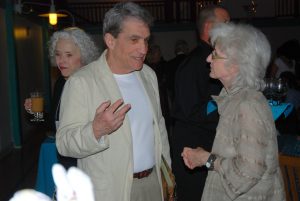
During those years in Rhode Island, C.D. wrote some of the most luminous and least predictable books American poetry has known. From the Southern-lyric poems of her early collections, such as Translation of the Gospel Back into Tongues and String Light, to her documentary collaboration with photographer Deborah Luster focused on the lives of Louisiana prisoners, One Big Self; from the rapturous long poem, Deepstep Come Shining, to the micro-essayistic works of The Poet, the Lion, Talking Pictures, El Farolito, A Wedding in St. Roch, The Big Box Store, The Warp in the Mirror, Spring, Midnights, Fire & All, C.D.’s work never repeated itself, but surprised its readers, swerving always toward new terrains of learning, evolving, and fidelity to the word. As her work makes clear from its start, for CD, ethics was a condition of being.
Over her lifetime, C.D. Wright’s works were published by leading presses and journals, such as Copper Canyon Press, Ecco, The New Yorker, Poetry Magazine, and The Nation, but also by innumerable independent, poet-run publishing projects that may well have been just starting out. She was democratic that way as in all things. Her readings and works were featured on NPR, PBS, and Poets.org, but also in the living rooms of fellow writers and friends. She received the nations greatest honors in art and literature, but she devoted Lost Roads to the discovery of new, often unpublished voices. Her engagement with writing was immediate and unpretentious, and based in the deeply-felt sense of generosity that permeates her books.
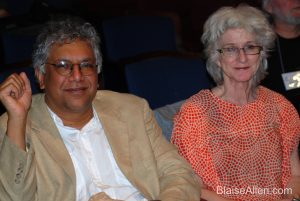
Poetry itself, for C.D., was that which liberates us by dodging categorization. “It may be that because poetry is the most difficult to pin to the wall,” she said, “it has a chance of a future.” And perhaps this is why C.D. Wright is so delightfully hard to pin to the wall, because she, like poetry, lived freely and variously and fully engaged with others and the world. As C.D. wrote, “It is a function of poetry to locate those zones inside us that would be free, and declare them so.” And declare them so she did, shining.
At the 7th Annual Palm Beach Poetry Festival in January 2011, C.D. Wright taught her workshop, Writing At The Edges Of Things: Being fierce, strange, calamitous, glowing, erroneous, blameless, side-splitting, starless, right-brained, formidable and unsure – now is the time to find the language compatible with your own condition. Whether one is writing to make amends, to get even, to fill the void, to impress the father, or just to pay off a few parking tickets… there are words for those motives and there is a shape for those words. As W.S. Merwin put it, “Never fear there is a hair hanging by everything it is the edges of things.” Bring new writing every day. Bring nothing you have written in advance of arriving. Writing will be done in and out of the workshop setting.
View poet's pageRobert Pinsky is one of America’s foremost poet-critics. Often called the last of the “civic” or public poets, Pinsky’s criticism and verse reflect his concern for a contemporary poetic diction that nonetheless speaks of a wider experience. Elected Poet Laureate of the United States in 1997, his tenure was marked by ambitious efforts to prove the power of poetry—not just as an intellectual pursuit in the ivory tower, but as a meaningful and integral part of American life. “I think poetry is a vital part of our intelligence, our ability to learn, our ability to remember, the relationship between our bodies and minds,” he told the Christian Science Monitor. “Poetry’s highest purpose is to provide a unique sensation of coordination between the intelligence, emotions and the body. It’s one of the most fundamental pleasures a person can experience.”
Pinsky was named poet laureate in 1997 and served until 2000. Under his direction, The Favorite Poem Project began with inviting ordinary Americans to name their favorite poems, and some entrants were asked to read for a permanent audio archive at the Library of Congress. Pinsky was inundated with letters and e-mails from all over the nation, and those participating represented all ages, all walks of life, and all levels of education.
With Maggie Dietz, Pinsky edited a representative volume of reader responses called Americans’ Favorite Poems: The Favorite Poem Project Anthology. A Publishers Weekly reviewer stated that “the selections are as diverse as the nation that chose them.” Americans’ Favorite Poems proved so popular that two subsequent collections have appeared: Poems to Read: A New Favorite Poem Project Anthology and An Invitation to Poetry: A New Favorite Poem Project Anthology. Booklist contributor Donna Seaman called Poems to Read “a graceful, sometimes jubilant, sometimes lyrical, sometimes brooding, but always welcoming and stirring collection.”Jersey Rain, published in 2000, was Pinsky’s first collection of completely new work since The Want Bone appeared a decade earlier. Reviewing the work in Library Journal, Christian Graham observed that Pinsky’s poems range from the mythic to the confessional. “Occasionally, his differing manners collide strangely,” Graham stated, “but Pinsky delivers, as ever, intelligent, pensive poetry of great beauty.” Pinsky’s latest book, Gulf Music, was published to wide acclaim in 2007. In a review for the New York Times, Joel Brouwer wrote that the collection was “not just an argument for but a demonstration of contemporary poetry’s necessity and vitality in our democracy.” Citing Pinsky’s influence as a critic and “American civic poet,” Brouwer continued: “Pinsky is our finest living specimen of this sadly rare breed, and the poems of “Gulf Music” are among the best examples we have of poetry’s ability to illuminate not only who we are as humans, but who we are — and can be — as a nation.”
Paul Breslin has commented that Pinsky “has emerged as the finest American poet-critic since Randall Jarrell”; Joel Brouwer that “[n]o other living American poet — no other living American, probably — has done so much to put poetry before the public eye.” For his own part, the last American poet laureate of the 20th century told the Progressive: “I think the rhythms in a lot of my writing are an attempt to create that feeling of a beautiful, gorgeous jazz solo that gives you more emotion and some more and coming around with some more, and it’s the same but it’s changed, and the rhythm is very powerful, but it is also lyricism. I think I’ve been trying to create something like that in my writing for a long time.”
At the 7th Annual Festival, in 2011, Robert Pinsky was our Special Guest and performed with the Paul Tardif Trio in the Crest Theatre to our first ever standing room only audience. He is pictured below at the annual festival Gala with poet, Carolyn Wright who was workshop faculty in the same year.
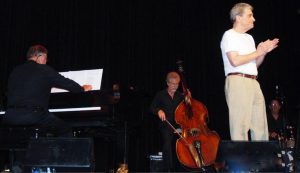
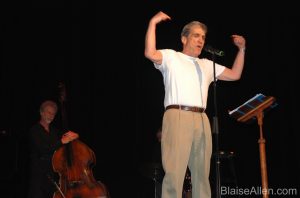
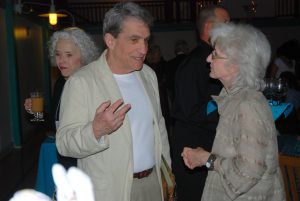
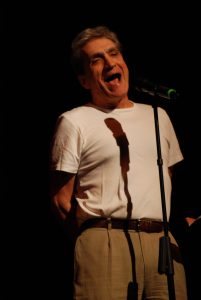
TAYLOR MALI is one of the few people in the world to have no job other than that of “poet.” Articulate, accessible, passionate, and downright funny, Mali studied drama in Oxford with members of The Royal Shakespeare Company and was one of the original poets to appear on the HBO series Russell Simmons Presents Def Poetry, and played the “Armani-clad villain” of the documentary film SlamNation. His poem “What Teachers Make” has been viewed over 4 million times on YouTube. Mali is vocal advocate of teachers and the nobility of teaching, having spent nine years in the classroom teaching everything from English and history to math and S.A.T. test preparation. He has performed and lectured for teachers all over the world and in 2012 he reached his goal of creating 1,000 new teachers through “poetry, persuasion, and perseverance.” His book of essays, What Teachers Make: In Praise of the Greatest Job in the World, is his passionate defense of teachers drawing on his own experiences, both in the classroom and as a traveling poet. Taylor Mali is is the author of two books of poetry, The Last Time As We Are (Write Bloody Books 2009) and What Learning Leaves (Hanover 2002), and four CDs of spoken word. Mali received a New York Foundation for the Arts Grant in 2001 to develop “Teacher! Teacher!” a one-man show about poetry, teaching, and math winner of best solo performance at the 2001 U. S. Comedy Arts Festival. Formerly president of Poetry Slam Incorporated, the non-profit organization that oversees all poetry slams in North America, Taylor Mali makes his living entirely as a spoken-word and voiceover artist, traveling around the country performing and teaching workshops.
View poet's pageThe Festival was pleased to welcome David Blair who performed at the Coffee House at the 7th Annual Festival in 2011. His performance was masterful and mesmerizing and his poems at home anywhere … stage or page. He died unexpectedly in July 2011.
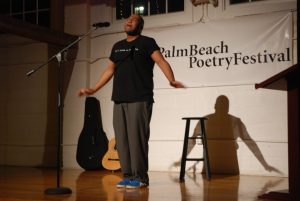
View poet's page
